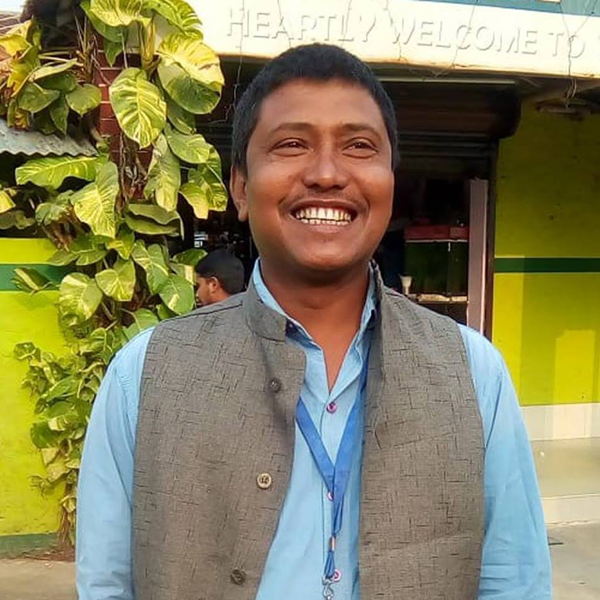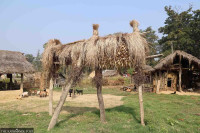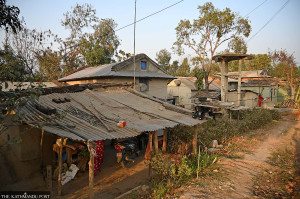Lumbini Province
Most local judicial committees in Province 5 are idle for lack of office space
Lack of physical infrastructure, employees, legal knowledge, awareness in the grass roots level are the major challenges behind the poor functioning of the body..jpg&w=900&height=601)
Madhab Aryal, Birendra KC, Manoj Poudel & Thakur Singh Tharu
Eight cases were registered at the judicial committee of Rambha Rural Municipality in Palpa district this fiscal year. Three cases seeking divorce were forwarded to the district court while five others were settled in agreement between the disputants without holding a bench.
“We don’t even have a room to hold a bench. We are compelled to settle the disputes in agreement,” said Radha Kumari Shrestha, the vice-chairperson of Rambha Rural Municipality, who heads the judicial committee.
According to Shrestha, the rural municipality office has been operating from a congested rented building and the judicial committee does not even have a room to hold discussions. “The vice-chairperson, account officer and other employees have to share a room. There is no possibility of holding discussions and forming a judicial bench,” added Shrestha.
The new constitution, promulgated by the Constituent Assembly in 2015, has envisaged the provision of judicial committees in each of the 753 local level units in the country with an objective to ensure that justice is delivered.
The Local Government Operation Act 2074 BS clarifies the functions and duties of the local judicial committee. The judicial committee has been empowered to settle disputes related to 13 specific matters including property boundary disputes; disputes regarding canals, dams, ditches or allocation of water; encroachment on roads or way out; disputes about compensation for damage to crops; disputes about payment of wages; and disputes about lost and found cattle.
However, the judicial committee in most of the local units have been unable to execute their responsibilities effectively even after two years of local level elections in the country. Lack of infrastructure and employees, lack of awareness regarding the provision of the judicial committee in the grass roots level and lack of legal knowledge among the people’s representatives are the major hurdles behind the ineffectiveness of the judicial committee.
A huge number of the local units in Province 5 does not have their own office buildings and are finding it doubly difficult to manage a separate space for the judicial committee. According to the people’s representatives, victims are reluctant to visit the judicial committee as there is no secrecy and secure environment.
Shiva Kumari Chaudhary, deputy mayor of Shivaraj Municipality in Kapilvastu district, said that discussions are held in open rooms and the disputants feel uncomfortable talking about their issues. “Secrecy and security are very important while settling cases with legal boundaries. The disputants refrain from speaking out clearly and present their cases. The environment is not conducive for disputants,” she added.
Manisara Nepali of Purbakhola Rural Municipality in Palpa came all way to the district administration office in Tansen, the district headquarters, last month to file a case about facing social discrimination in her village. The district administration immediately wrote to the Purbakhola Rural Municipality office and sent the victim there stating that such cases should be settled by the local judicial council. “I did not know about the provision of the judicial committee in the local body. I wasn’t aware of such an office so I came all the way to Tansen. Had I known earlier, I would have approached the committee in Purbakhola itself,” said Nepali.
As per the prevailing legal provision, there are three members in the judicial committee headed by the deputy chief of the local unit. Two elected representatives are selected by the meeting of the village council or municipal council. The committee can also appoint legal practitioners for help in settling the disputes.
Some disputants and even legal practitioners claim that the judicial committee has not been able to function impartially since the members are elected candidates of various political parties. “I registered a complaint at the judicial committee over a dispute regarding local development project,” said a woman from Arghakhanchi district, who chose to remain anonymous. “The coordinator of the judicial committee is affiliated to a political party and the case was filed against the activists of her party. So my complaint was not even heard.” She added that the people’s representatives fail to take decisions against the activists and supporters of the political party they represent.
The legal practitioners are also not convinced about fair justice delivery by the judicial committee. According to them, the people’s representatives elected from various political parties fail to exercise their legal rights.
“The voters influence the members of the judicial committee and the members never take action against the activists of their own party so they remain neutral. So far, the judicial committees are only for name sake,” said Bijaya Khatri, advocate and vice-chairman of Arghakhanchi District Bar.




 11.23°C Kathmandu
11.23°C Kathmandu.jpg)

















